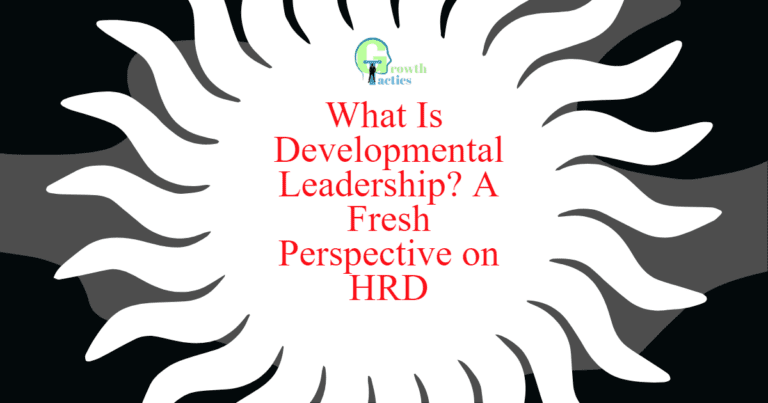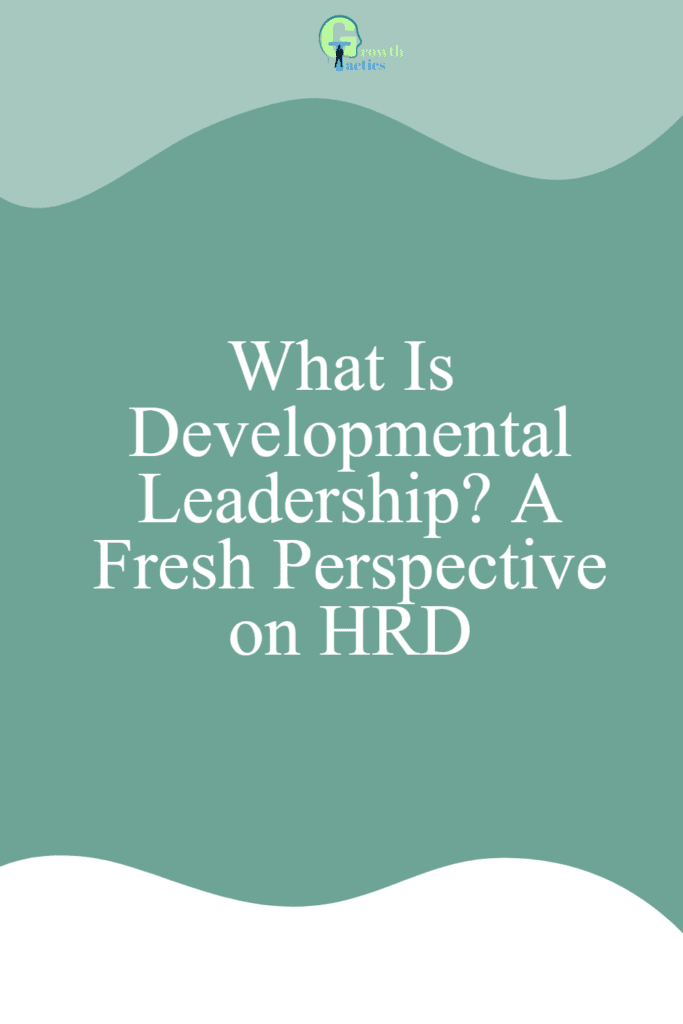Developmental leadership refers to the application of leadership principles that foster growth, improvement, and self-efficacy. This perspective on Human Resource Development (HRD) underscores the crucial role that leaders play not only in navigating the operational facets of an organization, but also in nurturing and advancing the personal and professional development of their team members.
Jump To Section
What is Developmental Leadership and Why Is It Important?
Understanding the Concept of Developmental Leadership
Developmental leadership, as a concept, is grounded in the idea that leaders should actively cultivate the growth and development of their team members alongside accomplishing organizational goals. This approach allows leaders to facilitate both individual and collective progress, surpassing the limitations of traditional, hierarchical leadership styles.
In essence, developmental leadership encompasses:
- Creating an inclusive, empowering environment
- Encouraging open communication and collaboration
- Facilitating learning opportunities
- Nurturing creativity and innovation
The Benefits of Developmental Leadership in Organizations
Adopting a developmental leadership approach can reap substantial benefits for organizations. These include:
- Greater employee engagement: As team members become more invested in their work, they also develop a deeper sense of loyalty and commitment to the organization.
- Improved adaptability: By fostering a culture that encourages learning and adaptation, organizations become more responsive to changing environments and competitive pressures.
- Enhanced creativity: A supportive and open environment allows for diverse perspectives to thrive, leading to novel solutions for complex problems.
- Higher retention rates: Employee turnover is reduced when individuals feel valued, and their professional development is prioritized.
Implementing a Leadership Development Program
To create a culture that perpetuates developmental leadership, companies should look to:
- Assess and define organizational goals and values.
- Identify current and future leaders in need of development and provide them with targeted learning opportunities.
- Develop a structured, holistic leadership development program that includes mentoring, workshops, and feedback sessions.
- Track progress and dynamically update the program to address individual and organizational needs.
- Continue the development process, even once goals have been achieved, to emphasize the importance of lifelong learning.
The Importance of Leadership Development in the HRD Field
HRD professionals play a critical role in advocating for and implementing developmental leadership. By making leadership development a strategic priority, the HRD field can emphasize people-centric management, enhance workforce capabilities, and drive organizational growth. In doing so, HRD professionals can position developmental leadership as a key pillar in maintaining a sustainable and competitive enterprise.
Developing Leadership Skills for Future Leaders
Investing in the growth and development of future leaders is not only paramount for business sustainability but also for supporting a thriving workplace culture. Organizations should provide resources to help employees identify and develop their leadership potential. This includes mentorship programs, workshops, and opportunities to lead meaningful projects.
By embracing developmental leadership as a standard practice, organizations can create an environment that fosters individual development, innovative thinking, and long-term success.
How Does Developmental Leadership Work?
Exploring Different Types of Leadership Styles
Just as there is no one-size-fits-all approach to management, there isn’t a single style of developmental leadership. Unique organizational contexts and individual characteristics can warrant different leadership approaches. Some might prefer a coaching style, where leaders continually provide support and feedback, while others might resonate with a more democratic style, encouraging open discussion and collective decision-making.
The Role of Competencies in Developmental Leadership
Certain competencies, such as communication skills, empathy, strategic thinking, and adaptability, are crucial for effective developmental leadership. Leaders must be proactive in identifying and cultivating these competencies to foster growth within their teams. Moreover, these competencies not only determine individual development but also heavily influence the team’s dynamic and overall organizational progression.
The Learning Process in Leadership Development
Continuous learning is at the core of developmental leadership. Through mentorship, training, and real-life experiences, leaders can gain new insights and refine their skills. This continuous learning process should be tailored to individual needs and professional goals, allowing for personal growth and increased ownership of one’s development journey.
The Role of Coaching in Developing Leadership Abilities
Coaching plays an indispensable role within the context of developmental leadership. By offering constructive feedback, challenging assumptions, and facilitating reflection, the coaching mechanism can unleash untapped potential in both leaders and their teams. It also serves as a powerful tool for reinforcing positive behaviors and mitigating leadership blind spots.
Communicating and Implementing Developmental Leadership Initiatives
For developmental leadership initiatives to succeed, they must be strategically communicated and thoughtfully implemented. This implies that the initiatives should align with the organization’s overarching goals. Furthermore, recognizing and celebrating achievements at different stages of the development process can boost motivation and propel individuals and organizations forward.
In essence, developmental leadership operates as a forward-looking approach that intertwines effective leadership practices and continuous growth. By recognizing the unique traits of leaders and fostering an environment of continued learning, organizations can leverage developmental leadership to expand capacities at all levels, setting the stage for unprecedented success.
Characteristics of a Good Leader
Key Behaviors of Effective Leaders
Effective leaders, particularly those adopting a developmental leadership approach, demonstrate a variety of key behaviors:
- Adaptability: Being able to adjust to changing circumstances and swiftly adapt strategies is essential for leaders.
- Empathy: Understanding the experiences and perspectives of team members helps to create a supportive and inclusive working environment.
- Proactive communication: Good leaders communicate their expectations clearly and listen attentively to foster mutual understanding and prevent misunderstandings.
- Inspiration: Leaders motivate their team by demonstrating enthusiasm and commitment, thus inspiring them towards shared goals.
The Importance of Good Leadership in Organizational Success
Good leadership is instrumental in shaping the culture and success of an organization. Effective leaders can drive productivity, nurture a positive work environment, inspire innovation and creativity, and contribute significantly to sustainable organizational growth.
Developing Leadership Skills for Managers and Executives
As key decision-makers within a company, managers and executives stand to benefit greatly from honing their leadership skills. This can take multiple forms – from participating in professional training or mentorship programs, setting tangible development goals, to seeking regular feedback for self-improvement.
The Role of HR in Leadership Development
The HR department is often responsible for designing and implementing leadership development programs. HR can play a critical role in identifying emerging leaders, aligning leadership development with the organization’s strategic goals, and fostering a culture that values and prioritizes development.
Team Members’ Perspectives on Developmental Leadership
A team’s perspective on their leader’s effectiveness can provide valuable insights into a leader’s development needs. Regular communication, performance reviews, and creating open channels for feedback can enhance trust, mutual respect, and collaboration. Guided by these principles, developmental leadership not only paves the way for individual growth but also fosters a vibrant, engaging, and productive workspace.
How Can Individuals Improve Their Leadership Skills?
The Process of Enhancing Leadership Abilities
Improving one’s leadership skills is an ongoing journey, encompassing diverse approaches and experiences. Here are some essential steps to follow in the process:
- Assess your current leadership skills: Identify your strengths and areas for improvement to create a clear roadmap for personal growth.
- Set clear development goals: Establish specific, measurable, achievable, relevant, and time-bound (SMART) goals for your leadership development.
- Engage in continuous learning: Actively participate in training, workshops, and other learning opportunities.
The Importance of Self-Reflection and Self-Awareness in Leadership Development
Leadership development hinges significantly on self-reflection and self-awareness. Understanding your values, strengths, weaknesses, and the impact of your actions on others can guide you in becoming a more effective leader.
Some strategies for cultivating self-awareness include:
- Seeking feedback from peers and managers
- Analyzing your reactions and behaviors in challenging situations
- Keeping a journal to capture insights and progress
Taking on Leadership Roles and Responsibilities
One of the most effective ways to improve leadership skills is by taking on leadership roles and responsibilities. Volunteering for projects, joining committees, or leading initiatives can provide opportunities to:
- Develop problem-solving and decision-making abilities
- Enhance communication skills
- Learn how to manage teams and delegate tasks effectively
The Role of Mentorship in Developing Leadership Skills
Mentorship is an invaluable component of leadership development. Engaging with experienced professionals can assist in:
- Learning from their expertise and experiences
- Gaining insights into organizational culture and dynamics
- Receiving valuable guidance and constructive feedback
Continuous Learning as a Part of Leadership Development
Leadership development is an ongoing process that thrives on continuous learning. Staying up-to-date on industry trends, mastering emerging technologies, and embracing new management approaches are vital for staying ahead of the curve. Furthermore, cultivating a growth mindset, recognizing setbacks as learning opportunities, and embracing change will strengthen leadership abilities and contribute to personal and professional success.
Conclusion
Developmental leadership offers a fresh perspective on HR practices, focusing on fostering individual growth, nurturing team dynamics, and driving organizational success. By embedding developmental leadership into the fabric of their strategies, HR professionals can cultivate a people-centric culture that values continuous learning and collaboration.
Spotting and grooming potential leaders, encouraging self-reflection and mentorship, enhancing core leadership competencies, and taking on new roles and responsibilities are all elements of this approach. It requires commitment and courage to embrace change and uncertainty, yet it promises rich rewards by creating more engaged, adaptable, and innovative teams.
In a rapidly changing business landscape, developmental leadership provides a strategic advantage by emphasizing the importance of personal development and learning upfront, signaling the way forward for a resilient and successful organization.


